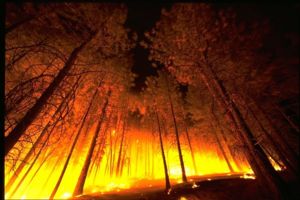Fire
Fire is the result of a chemical process that produces heat, light, and smoke. Fire is dependent on oxygen for combustion and will spread if not controlled.
Physics of fire
The "fire triangle" is a term which refers to the three elements necessary for a fire to burn: oxygen, fuel, and a source of heat. Remove any one of the three and the fire can no longer burn. All firefighting tactics are based on removing one or more of the three elements in the fire triangle.
Types of heat transfer: Radiant, conductive, and convective. Conductive heat is transferred by direct contact with the heat source. Convective heat is transferred by hot gases from the heat source, often to objects above the heat source since heat rises. Radiant heat is transferred through radiation of the heat not involving hot gases. To illustrate, when you hold a metal spoon in a cup of hot coffee and feel the spoon get hot, this is conductive heat. When you stand near a campfire and feel the heat on your face, this is radiant heat. When hot steam is rising from a boiling pot of water, this is convective heat.
Christian symbolism
The symbol of the Holy Ghost is fire. Fire is also used frequently to depict Hell; many Christians disagree on whether Hell contains literal flames or whether the flames are meant as a metaphor.
